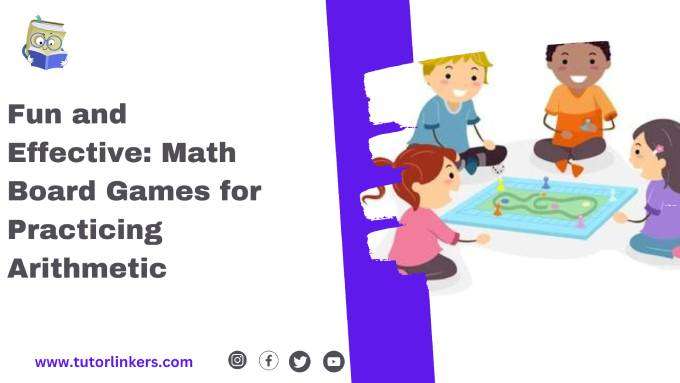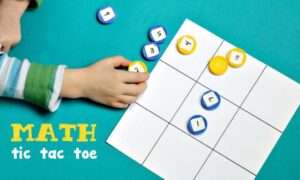Math Board Games for Practicing Arithmetic: In the realm of mathematics education, finding engaging ways to practice arithmetic skills is essential for building fluency and confidence among learners. Math board games offer a dynamic and enjoyable approach to practicing arithmetic, making learning interactive and fostering a deeper understanding of mathematical concepts. In this blog post, we’ll explore the benefits of using math board games, discuss different types of games available, highlight popular examples, and provide insights into how these games can enhance arithmetic skills across various age groups.
Mathematics is a fundamental subject that underpins many aspects of our daily lives, and arithmetic forms the foundation of mathematical proficiency. However, practicing arithmetic can sometimes be perceived as mundane or repetitive. This is where online tutor platforms can play a transformative role in complementing math board games by providing personalized guidance, additional practice resources, and expert support to enhance learners’ arithmetic skills in an engaging and effective manner.
By combining math board games with online tutor platforms, learners can benefit from a well-rounded and comprehensive approach to arithmetic practice, ensuring a deeper grasp of mathematical concepts and fostering a positive attitude towards learning.
2. Benefits of Math Board Games
Math board games offer several advantages that contribute to effective learning:
- Promotes Active Learning: Players actively participate in solving problems and making decisions, leading to deeper engagement with arithmetic concepts.
- Enhances Critical Thinking: Games require strategic planning and logical reasoning, fostering essential problem-solving skills.
- Fosters Collaboration: Multiplayer board games encourage teamwork and communication, promoting social interaction while learning.
3. Types of Math Board Games
Math board games cover a wide range of arithmetic topics, including:
| Types of Math Board Games | Description |
|---|---|
| Addition and Subtraction Games | Focus on basic arithmetic operations such as addition and subtraction. Players solve math problems to progress in the game. |
| Multiplication and Division Games | Reinforce multiplication and division facts through interactive gameplay. Encourage memorization of times tables and division facts. |
| Fraction and Decimal Games | Introduce concepts of fractions, decimals, and proportional reasoning in a playful setting. Require players to perform operations with fractions and decimals. |
| Math Bingo | A classic game where players mark numbers on their bingo cards by solving arithmetic problems. Reinforces addition, subtraction, multiplication, and division skills. |
| Monopoly Math | Integrates arithmetic into the popular Monopoly game, where players manage money, calculate rent, and make strategic decisions based on arithmetic calculations. |
| Prime Climb | Focuses on prime numbers and mathematical strategies. Players use arithmetic operations to navigate through a race to the finish line. |
| Math Card Games | Utilizes playing cards to practice arithmetic skills. Games like “War” or “Twenty-One” can be adapted to reinforce addition, subtraction, multiplication, and division. |
4. Popular Math Board Games
Let’s explore some popular math board games that combine fun with learning:
- “Math Bingo”: Players solve arithmetic problems to mark numbers on their bingo cards, reinforcing addition, subtraction, multiplication, and division skills.
- “Monopoly Math”: Integrates arithmetic into the classic Monopoly game, where players manage money, calculate rent, and make strategic decisions.
- “Prime Climb”: A strategic math game that explores prime numbers and mathematical strategies in a race to the finish line.
5. Educational Value of Math Board Games
Math board games offer unique educational benefits:
- Improves Math Fluency: Repetitive practice through gameplay reinforces arithmetic facts and enhances computational speed.
- Builds Confidence: Success in games boosts students’ confidence in their mathematical abilities and fosters a positive attitude towards learning.
- Supports Differentiated Learning: Games can be adapted to different skill levels, allowing for personalized learning experiences.
6. How to Use Math Board Games Effectively
To maximize the benefits of math board games, consider the following strategies:
- Select Appropriate Games: Choose games that align with specific learning objectives and cater to the age and skill level of players.
- Incorporate Game Time into Routine: Integrate math board games into classroom activities, study sessions, or family game nights to make learning enjoyable.
- Emphasize Learning Goals: Encourage players to focus on understanding mathematical concepts while having fun playing the games.
7. Benefits for Different Age Groups
Math board games cater to learners of all ages:
- Early Childhood: Introduce counting, number recognition, and basic arithmetic skills in a playful environment.
- Elementary School: Reinforce addition, subtraction, multiplication, and division operations through engaging gameplay.
- Middle and High School: Challenge students with more complex math concepts such as fractions, decimals, and problem-solving strategies.
8. Impact on Academic Performance
Research supports the positive impact of math board games on academic achievement:
| Impact on Academic Performance | Description |
|---|---|
| Improved Math Fluency | Regular practice with math board games reinforces arithmetic skills, leading to increased speed and accuracy in solving math problems. |
| Enhanced Problem-Solving Skills | Games require strategic thinking and decision-making, improving students’ ability to approach and solve mathematical problems efficiently. |
| Increased Engagement and Motivation | Interactive and enjoyable gameplay motivates students to actively participate in learning activities, leading to higher levels of engagement with mathematics. |
| Positive Attitude Towards Math | Success in math board games fosters confidence and a positive mindset towards mathematics, reducing math anxiety and promoting a growth mindset. |
| Improved Academic Achievement | Studies show that integrating math board games into curriculum correlates with improved academic performance, especially in arithmetic and problem-solving. |
9. Conclusion
Math board games offer a compelling pathway to mastering arithmetic skills while making learning enjoyable and rewarding. By leveraging the benefits of math board games, educators and parents can inspire a lifelong love of mathematics in learners of all ages.
10. Call to Action
Ready to level up your arithmetic skills with math board games? Explore the diverse world of math board games, pick your favorites, and embark on a fun-filled journey of mathematical discovery. Whether you’re a student, educator, or parent, math board games are the perfect tool to make arithmetic practice engaging and effective!
Read More: Interactive globes for geography lessons
FAQ’s
1. How can math board games benefit arithmetic practice?
Answer: Math board games offer an engaging and interactive way to practice arithmetic skills. They promote active learning, enhance problem-solving abilities, and improve math fluency through enjoyable gameplay. Players develop strategic thinking and gain confidence in their mathematical abilities, leading to improved performance in arithmetic.
2. What age groups can benefit from using math board games?
Answer: Math board games are versatile and can benefit learners of all ages. There are games designed for early childhood, elementary, middle, and high school students, as well as adults. The complexity and focus of the games can be adapted to match the developmental level and skill proficiency of different age groups.
3. How can educators incorporate math board games into classroom or home learning?
Answer: Educators can integrate math board games into curriculum planning and classroom activities to reinforce arithmetic concepts. Math board games can also be used during family game nights or as part of homework assignments to provide additional practice in a fun and engaging way. Educators should select games that align with learning objectives and encourage collaboration and critical thinking among students.
Ehsan Ali is a seasoned content writer and researcher with a talent for translating complex concepts into clear, engaging content. With a deep understanding of human behavior, societal trends, and technical topics, Ehsan creates insightful and impactful content that resonates with a broad audience. His expertise ensures that each piece is both accessible and compelling, bridging the gap between intricate details and everyday understanding.





